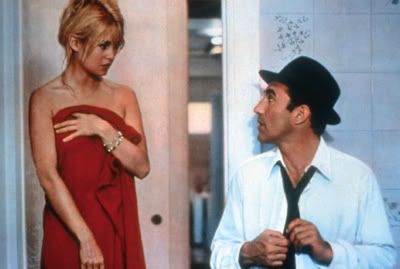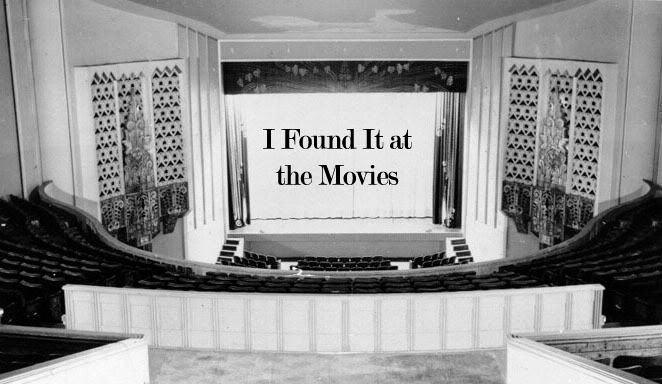Contempt is currently playing at Film Forum in downtown Manhattan until Tuesday, April 8th. The film is also available on an excellent DVD from the Criterion Collection.

Madelyn,
I don't know if you've had a chance to re-watch Contempt yet, but I suppose that since this whole scheme was my idea, I'll be the first to jump in. Let me also note that I plan to read the source novel by Alberto Moravia before this correspondence is over.
Having seen Contempt again last week (and for the first time on the big screen), I am still awestruck by the power the movie has on me. Never again did Jean-Luc Godard have a similar kind of power in one of his films, even in the ones I have held more dearly to my heart. Set amidst the master's 15-film winning streak in the 1960s, Contempt lacks the puckish anarchy of Pierrot le Fou, the apocalyptic majesty of La Chinoise and Weekend, the gleeful abandon of Breathless, A Woman is a Woman, Band of Outsiders and Masculin Feminin, and the academic depth of Les Carabiniers, Alphaville and 2 or 3 Things I Know About Her-- but it has to be, alongside Vivre sa Vie, Godard's most emotionally satisfying work. And perhaps why that is has something to do with the subject he is honoring and deconstructing: the art film.
The topics of art vs. commerce, tradition vs. modernity, man vs. nature: these were subjects taken on by the great art filmmakers of the day. At least, they were so-called because the industry decided that a certain type of world cinema had to be codified as a genre. Antonioni, Bergman, and to a certain extent Resnais all dealt with this type of modern, ambiguous cinema, and Godard set out to probe just how they may have all connected into such a genre as the "art film." Paul Javal (Michel Piccoli) is the frustrated screenwriter who sells his soul to a boorish American producer, Jerry Prokosch (Jack Palance) in order to make some quick money for he and his young wife, Camille (Brigitte Bardot). But in the process, a series of misunderstandings leads Camille to loathe Paul for his avarice, his potential infidelity, and his insouciance toward Prokosch's advances toward her. All the while, Fritz Lang, who is directing the adaptation of The Odyssey being written by Paul, stands at an observational distance, a relic from a past Contempt craves to reclaim, but cannot.
The distance between not only Paul and Camille but between Paul and everybody else is emphasized by the language barrier established from the humorous concept of the "international production." One of the most tender scenes involves Lang and Francesca (Giorgia Moll), Prokosch's assistant. They are the only two who speak all involved languages (French, English, Italian, German), and they seem to hold a deep warmth for each other because of this. Such tenderness doesn't exist between any two characters in the film, even Paul and Camille.
Famously, the prologue of a nude Camille and Paul lying in bed was forced on Godard by the film's producers, Georges de Beauregard, Carlo Ponti and Joseph Levine. They thought that there wasn't enough "skin" of Bardot on screen, which would naturally be the main selling point, right? What Godard does in that moment is not only expose the audience's voyeurism, but also problematizes Bardot's own image of herself. The persistent questioning of Paul about whether or not he loves her various body parts illuminates Camille's deep insecurity about herself, and gives us a prophetic image of why Paul and Camille's marriage is fragile long before Paul becomes involved with Prokosch.
As emotionally involved as we become with Paul and Camille, Godard deliberately forces us to examine their tenderness and cruelty from a distance. He shoots long, distant takes that are never clean in their mise en scene. Most famously, in the extended break-up/make-up scene between Paul and Camille, pillars, doors, and even lampshades prevent the two characters from joining in proper unity. Indeed, the apartment itself becomes a war zone.
Flash cuts remind us of the past and predict the future. Georges Delerue's brilliant score comes and goes seemingly at random. During a vaudeville show, the music stops so the characters can converse uninterrupted. And what Lang is seemingly making is a delicious parody of a traditional misconception of the "art film," when in fact, in the form of Contempt, the audience is witnessing one of its greatest incarnations. Godard is constantly distancing us from natural emotion, which in its own perverse way makes us feel even stronger the emotional catastrophe that Paul and Camille are inflicting on each other. In the late 1950s/early 1960s heyday of the "art film," Godard made the weirdest and most beautiful of them all.
This is all perhaps a bit vague in its effusiveness, but I think that depth will be achieved once the sparring begins. I look forward to your rebuttal.
-Evan


4 comments:
Dude, vous êtes un espèce d'idiot.
You're not the first to tell me, fella. Although you are the first to tell me in French.
but damn you're charming.
This is funny I remember on my high school days I really hated a partner and someone left us inside a warehouse for 3 hours I guess, but we really dislike each other and 30 minutes later we start talking, and I could never imagine how much in commmon we had, to not extend the story, we start dating and until now we live together haha
Thanks for let publishing this little story, good luck.
Post a Comment